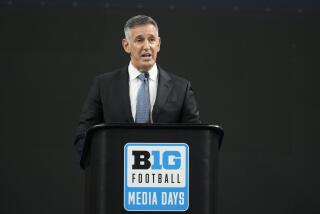College football’s lack of leadership has never been more evident
- Share via
Saturday was a gorgeous day for football, until the grown-ups ruined it.
The marine layer lifted over the Rose Bowl to reveal Texas in pristine white uniforms and, unfortunately, UCLA.
However, the sun couldn’t break through the onset of panic and greed: Call it the “fog of more.”
Headlines in September are supposed to be about touchdowns and tackles, not league switches and lunacy.
“It’s a big distraction,” Pacific 12 Conference Commissioner Larry Scott conceded as he held court (again) in another press box (again), answering questions that have nothing to do with football (again). “It’s regrettable this is a distraction to what’s happening on the field.”
A field, what’s that?
News that Big East Conference members Pittsburgh and Syracuse have applied to join the Atlantic Coast Conference could set in motion the next onslaught of reconfiguration.
If the ACC becomes the first football league to 14 schools, the great race to super conferences is on.
It wouldn’t happen this indelicately if somebody was in charge of college football, but, of course, no one is in charge.
A grand football commissioner would not allow Texas A&M to tentatively join the Southeastern Conference during a huddle break.
A czar would not let Oklahoma and Texas play chicken with the sport’s future while the marching bands are playing.
A leader would not allow Pitt and Syracuse to switch leagues during the national anthem.
Somebody with a backbone and a clause to act “in the best interests of college football” would not tolerate such in-season nonsense.
The NCAA has an office in Indianapolis and is theoretically in charge of rules and regulations, but it controls football the way you control your cat. In what other sport, during the season, can a team be in the Big 12 on Monday and the SEC on Thursday?
Expansion and realignment are not new concepts to sports, or college football. Change and growth go hand-in-hand with power accumulation and the insatiable appetite for television revenue.
The ACC, a few years back, was considerate enough to raid Big East members Miami and Virginia Tech in the summer.
It is impossible to do it now and think the sport is better for it. College football should not be irrevocably shaken during the quarter break of Texas-UCLA.
You want to change conferences, put people out of work and dismantle decades-old rivalries? How about doing it on Amelia Island in June?
College football boasts the best regular season in sports. It’s the argument officials make in not wanting a playoff. They say don’t want to devalue the regular season.
But what value is there in doing this now?
“Chaos in June is one thing,” one BCS executive said Saturday. “Chaos in September is detrimental to the sport.”
The trigger mechanism was supposed to be Big 12 members releasing Texas A&M to become the SEC’s 13th member, a move being held up by legal wrangling.
So give the ACC “credit” if it gets to 14 teams first.
The Pac-12 has been careful not to look predatory in wishing to expand to 14 or 16 teams. Scott has said his league would be happy staying at 12 as long as everyone else stayed at 12. He has also made it clear that any move beyond 12 would trip the wire.
Scott thought he would be having this conversation in three years, not at 3 p.m. Saturday.
“I’m surprised at the pace of the destabilization in the other conferences,” he said.
What happens now?
Scott said other schools have expressed interest in the Pac-12, but no one has applied for membership. Watch closely now. Regents from Oklahoma and Texas are scheduled to meet Monday to discuss conference membership.
It wouldn’t be a shock if Oklahoma petitions the Pac-12 very shortly. The Pac-12 is keen on Texas, but the school’s Longhorn Network with ESPN is a serious impediment. The Pac-12 insists on equal revenue sharing.
It was a coincidence that Texas was playing UCLA at the same time all this is playing out, but not coincidence that Scott was in attendance.
Scott was adamant that he was not meeting with Texas officials on this trip, but rest assured there have been discussions.
Scott seemed to leave little wiggle room in terms of Texas — or any school with its own network deal — bringing that arrangement into his house.
“We’re very proud of equal sharing,” Scott said. “It’s one of the hallmarks of a stable conference … that’s not going to change.”
Options appear limited if Texas won’t cede on the issue. There is speculation that the Longhorns might join the ACC, or go independent. Texas’ preference is to hold the Big 12 together, but that seems like a Longhorn long shot.
Schools are scared. It’s like a run on money at the Bailey Building & Loan.
This is only the beginning of Scott’s third year as Pac-12 commissioner, so he’s not sure how change will alter the sport.
What would Texas never playing Oklahoma mean?
Was Missouri versus Kansas a big deal?
“I don’t have a great historical perspective being so new to it,” Scott said.
Scott, though, is already looking 10 years ahead. He thought he had a 16-team deal involving Texas and Oklahoma last year, but it fell through.
Nothing’s ever done until it’s done; things could unravel again
However: “There are certainly are a lot of smoke signals,” Scott said.
Here’s a thought: Next time college leaders want to blow smoke, don’t wreck your regular-season religion in the process.
Blow it on your own time.
twitter.com/dufresnelatimes
More to Read
Go beyond the scoreboard
Get the latest on L.A.'s teams in the daily Sports Report newsletter.
You may occasionally receive promotional content from the Los Angeles Times.











